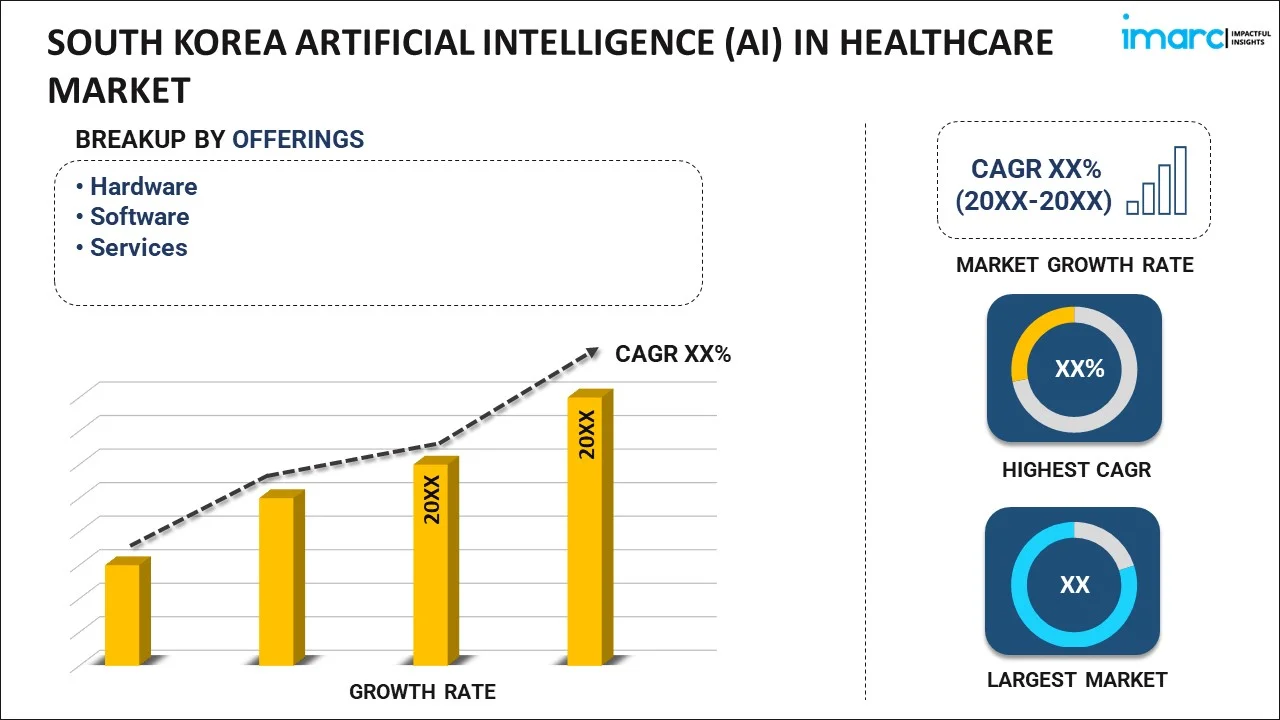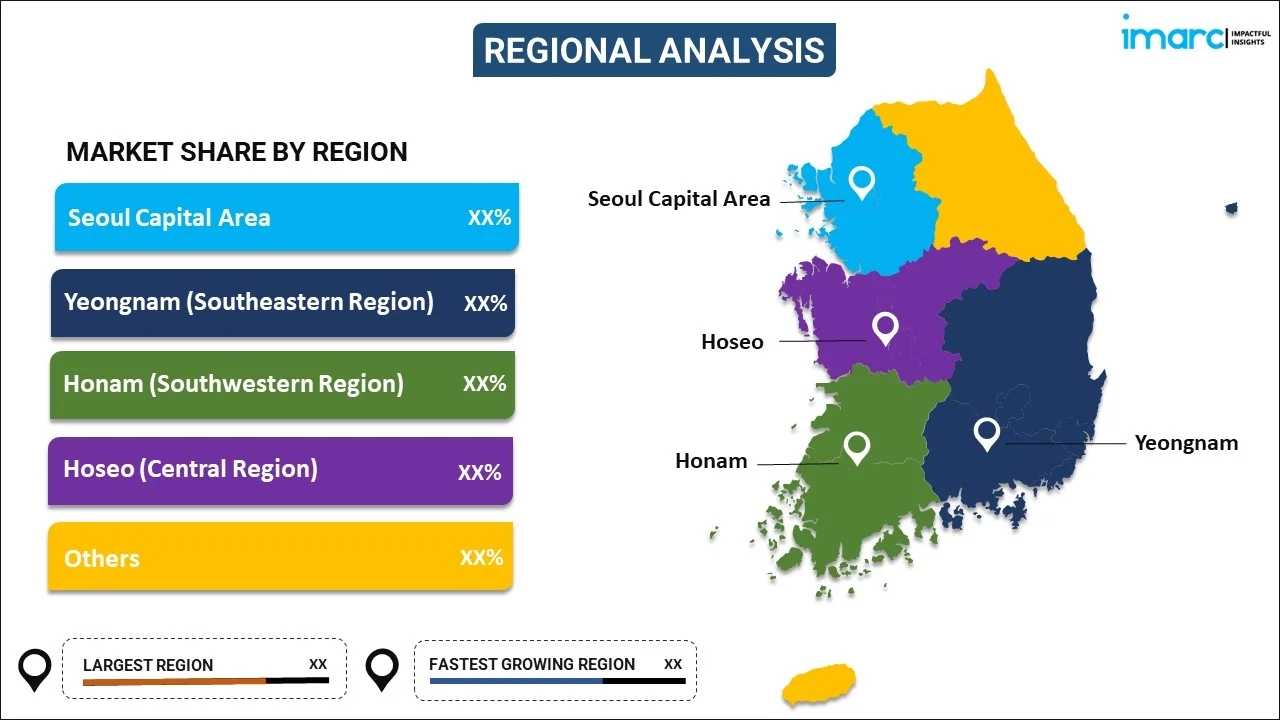
South Korea Artificial Intelligence (AI) in Healthcare Market Report by Offering (Hardware, Software, Services), Technology (Machine Learning, Context-Aware Computing, Natural Language Processing, and Others), Application (Robot-Assisted Surgery, Virtual Nursing Assistant, Administrative Workflow Assistance, Fraud Detection, Dosage Error Reduction, Clinical Trial Participant Identifier, Preliminary Diagnosis, and Others), End User (Healthcare Providers, Pharmaceutical and Biotechnology Companies, Patients, and Others), and Region 2026-2034
Market Overview:
South Korea artificial intelligence (AI) in healthcare market size reached USD 189.7 Million in 2025. Looking forward, IMARC Group expects the market to reach USD 1,310.5 Million by 2034, exhibiting a growth rate (CAGR) of 23.96% during 2026-2034. The increasing demand for AI-powered diagnostic tools, which can help identify patterns and anomalies that might not be apparent to human observers, leading to more precise treatment planning and better patient outcomes, is primarily driving the regional market.
|
Report Attribute
|
Key Statistics
|
|---|---|
|
Base Year
|
2025
|
|
Forecast Years
|
2026-2034
|
|
Historical Years
|
2020-2025
|
| Market Size in 2025 | USD 189.7 Million |
| Market Forecast in 2034 | USD 1,310.5 Million |
| Market Growth Rate 2026-2034 | 23.96% |
Access the full market insights report Request Sample
Artificial intelligence (AI) in healthcare refers to the application of computer algorithms and software to mimic human cognition in analyzing complex medical data. It encompasses various techniques such as machine learning, natural language processing, and computer vision to interpret and derive insights from vast amounts of healthcare data. AI in healthcare can enhance clinical decision-making, improve patient outcomes, and streamline administrative processes. It enables predictive analytics for identifying patients at risk, personalized treatment recommendations, and early disease detection. AI-powered systems can analyze medical images, assist in diagnoses, and automate repetitive tasks, allowing healthcare professionals to focus more on patient care. Additionally, AI facilitates precision medicine by analyzing genetic and molecular information to tailor treatments to individual patients. However, challenges such as data privacy concerns, regulatory issues, and algorithm biases need to be addressed to realize the full potential of AI in transforming healthcare delivery and improving overall health outcomes.
South Korea Artificial Intelligence (AI) in Healthcare Market Trends:
The artificial intelligence (AI) in healthcare market in South Korea is revolutionizing the healthcare sector, propelled by several key drivers. Firstly, advancements in AI algorithms and machine learning techniques have enhanced the accuracy and efficiency of medical diagnosis, treatment planning, and patient care. These innovations enable healthcare providers to analyze vast amounts of patient data quickly and accurately, leading to more precise diagnoses and personalized treatment strategies. Additionally, the increasing adoption of electronic health records (EHRs) and digital health technologies has created vast repositories of medical data, providing fertile ground for AI-driven insights and decision-making. Moreover, the rising demand for cost-effective healthcare solutions and the need to optimize resource utilization are driving healthcare organizations to integrate AI technologies into their operations. AI-powered predictive analytics and preventive healthcare tools help identify high-risk patients, anticipate disease outbreaks, and streamline workflow processes, thereby reducing healthcare costs and improving patient outcomes. Furthermore, the growing prevalence of chronic diseases and aging populations in South Korea necessitates innovative approaches to healthcare delivery. AI-driven telemedicine platforms, remote monitoring devices, and virtual health assistants empower patients to actively manage their health while minimizing the burden on healthcare systems. In conclusion, the convergence of technological advancements, data proliferation, and evolving healthcare needs underscores the transformative potential of AI in revolutionizing the healthcare industry, driving improved patient outcomes, operational efficiencies, and cost savings.
South Korea Artificial Intelligence (AI) in Healthcare Market Segmentation:
IMARC Group provides an analysis of the key trends in each segment of the market, along with forecasts at the country level for 2026-2034. Our report has categorized the market based on offering, technology, application, and end user.
Offering Insights:

To get detailed segment analysis of this market Request Sample
- Hardware
- Software
- Services
The report has provided a detailed breakup and analysis of the market based on the offering. This includes hardware, software, and services.
Technology Insights:
- Machine Learning
- Context-Aware Computing
- Natural Language Processing
- Others
A detailed breakup and analysis of the market based on the technology have also been provided in the report. This includes machine learning, context-aware computing, natural language processing, and others.
Application Insights:
- Robot-Assisted Surgery
- Virtual Nursing Assistant
- Administrative Workflow Assistance
- Fraud Detection
- Dosage Error Reduction
- Clinical Trial Participant Identifier
- Preliminary Diagnosis
- Others
The report has provided a detailed breakup and analysis of the market based on the application. This includes robot-assisted surgery, virtual nursing assistant, administrative workflow assistance, fraud detection, dosage error reduction, clinical trial participant identifier, preliminary diagnosis, and others.
End User Insights:
- Healthcare Providers
- Pharmaceutical and Biotechnology Companies
- Patients
- Others
A detailed breakup and analysis of the market based on the end user have also been provided in the report. This includes healthcare providers, pharmaceutical and biotechnology companies, patients, and others.
Regional Insights:

To get detailed regional analysis of this market Request Sample
- Seoul Capital Area
- Yeongnam (Southeastern Region)
- Honam (Southwestern Region)
- Hoseo (Central Region)
- Others
The report has also provided a comprehensive analysis of all the major regional markets, which include Seoul Capital Area, Yeongnam (Southeastern Region), Honam (Southwestern Region), Hoseo (Central Region), and Others.
Competitive Landscape:
The market research report has also provided a comprehensive analysis of the competitive landscape. Competitive analysis such as market structure, key player positioning, top winning strategies, competitive dashboard, and company evaluation quadrant has been covered in the report. Also, detailed profiles of all major companies have been provided.
South Korea Artificial Intelligence (AI) in Healthcare Market Report Coverage:
| Report Features | Details |
|---|---|
| Base Year of the Analysis | 2025 |
| Historical Period | 2020-2025 |
| Forecast Period | 2026-2034 |
| Units | Million USD |
| Scope of the Report | Exploration of Historical Trends and Market Outlook, Industry Catalysts and Challenges, Segment-Wise Historical and Future Market Assessment:
|
| Offerings Covered | Hardware, Software, Services |
| Technologies Covered | Machine Learning, Context-Aware Computing, Natural Language Processing, Others |
| Applications Covered | Robot-Assisted Surgery, Virtual Nursing Assistant, Administrative Workflow Assistance, Fraud Detection, Dosage Error Reduction, Clinical Trial Participant Identifier, Preliminary Diagnosis, Others |
| End Users Covered | Healthcare Providers, Pharmaceutical and Biotechnology Companies, Patients, Others |
| Regions Covered | Seoul Capital Area, Yeongnam (Southeastern Region), Honam (Southwestern Region), Hoseo (Central Region), Others |
| Customization Scope | 10% Free Customization |
| Post-Sale Analyst Support | 10-12 Weeks |
| Delivery Format | PDF and Excel through Email (We can also provide the editable version of the report in PPT/Word format on special request) |
Key Questions Answered in This Report:
- How has the South Korea artificial intelligence (AI) in healthcare market performed so far and how will it perform in the coming years?
- What has been the impact of COVID-19 on the South Korea artificial intelligence (AI) in healthcare market?
- What is the breakup of the South Korea artificial intelligence (AI) in healthcare market on the basis of offering?
- What is the breakup of the South Korea artificial intelligence (AI) in healthcare market on the basis of technology?
- What is the breakup of the South Korea artificial intelligence (AI) in healthcare market on the basis of application?
- What is the breakup of the South Korea artificial intelligence (AI) in healthcare market on the basis of end user?
- What are the various stages in the value chain of the South Korea artificial intelligence (AI) in healthcare market?
- What are the key driving factors and challenges in the South Korea artificial intelligence (AI) in healthcare?
- What is the structure of the South Korea artificial intelligence (AI) in healthcare market and who are the key players?
- What is the degree of competition in the South Korea artificial intelligence (AI) in healthcare market?
Key Benefits for Stakeholders:
- IMARC’s industry report offers a comprehensive quantitative analysis of various market segments, historical and current market trends, market forecasts, and dynamics of the South Korea artificial intelligence (AI) in healthcare market from 2020-2034.
- The research report provides the latest information on the market drivers, challenges, and opportunities in the South Korea artificial intelligence (AI) in healthcare market.
- Porter's five forces analysis assist stakeholders in assessing the impact of new entrants, competitive rivalry, supplier power, buyer power, and the threat of substitution. It helps stakeholders to analyze the level of competition within the South Korea artificial intelligence (AI) in healthcare industry and its attractiveness.
- Competitive landscape allows stakeholders to understand their competitive environment and provides an insight into the current positions of key players in the market.
Need more help?
- Speak to our experienced analysts for insights on the current market scenarios.
- Include additional segments and countries to customize the report as per your requirement.
- Gain an unparalleled competitive advantage in your domain by understanding how to utilize the report and positively impacting your operations and revenue.
- For further assistance, please connect with our analysts.
 Request Customization
Request Customization
 Speak to an Analyst
Speak to an Analyst
 Request Brochure
Request Brochure
 Inquire Before Buying
Inquire Before Buying




.webp)




.webp)












